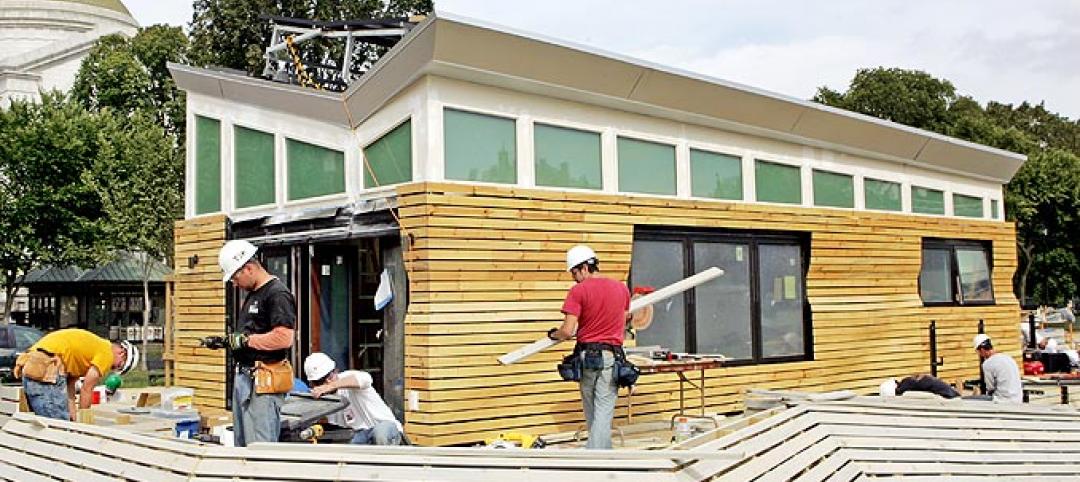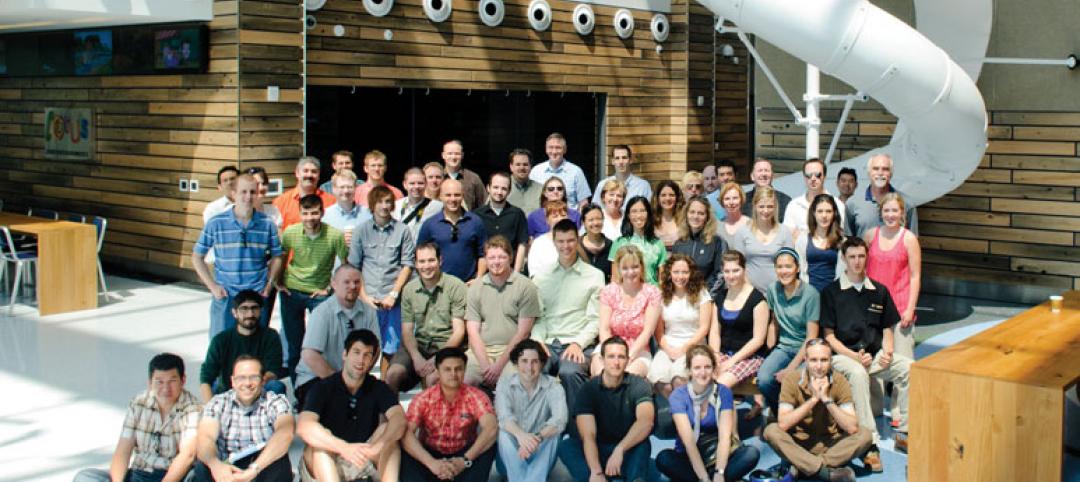A Buro Happold-led team recently completed work on standards for sustainable design and construction performance for the University of Southern California.
The document sets out sustainable strategies for the design and construction of new buildings, renovations, and asset renewal projects. The institution’s sustainable construction strategy includes a key focus on the chemical health and embodied carbon of building materials.
The new guidelines establish process management guidance for project teams to understand their roles and responsibilities, as well as key sustainability activities required for tracking and reporting. A section on life-cycle cost analysis (LCA) provides a basis for USC to develop cost-effective design options over the lifetime of a project along with assessing the environmental impact of project materials.
Development of the guidelines makes USC one of the first campuses to adopt a formal policy for life-cycle analyses to tackle embodied carbon.
More details on USC's Sustainable Design and Construction Guidelines
Here is the full press release from Buro Happold:
Buro Happold, a sustainability leader known for creating long-range plans and benchmarks for leading institutions, companies and municipalities worldwide, has led a team that recently completed key standards for environmental design and construction performance for the University of Southern California (USC).
Buro Happold led the sustainability guideline development process for the University of Southern California with its acclaimed human-centric approach — “ensuring that the built environment touches the earth lightly while also caring for its occupants,” says the firm’s leaders. Also involved in the blue-ribbon team creating the guidelines are the consulting partners Perkins&Will, civil engineer Psomas, as well as AHBE | MIG and David Neuman of Neu Campus Planning.
“Prepared in collaboration with key stakeholders across USC — from faculty and staff to student interns — the USC Sustainable Design & Construction Guidelines advance the University’s commitment to sustainable strategies for the design and construction of new buildings, renovations, and asset renewal projects with impacts across multiple areas,” according to Christopher J. Toomey, Vice President & Executive Director, USC Facilities Planning & Management. He added that the guidelines work alongside the USC Facilities Design Guidelines and many of the key goals set in the university commitment document, Assignment: Earth, the 2028 Sustainability Framework covering such areas as zero waste, water reduction and carbon neutrality.
The multidisciplinary firm Buro Happold, also known as a leader in higher education strategy, campus planning and sustainable strategy and building design, was selected through a competitive process to develop these new sustainable design guidelines for USC, an urban research university ranked among the best in the United States. Buro Happold has created campus-wide standards and overarching sustainability plans for other universities globally, for private corporations such as Aviva Partners, as well as for local governments from the County of Los Angeles to New York’s Battery Park City.
For USC, the new guidelines establish process management guidance for project teams to understand their roles and responsibilities, as well as key sustainability activities required for tracking and reporting. A section on life-cycle cost analysis (LCA) provides a basis for USC to develop cost-effective design options over the lifetime of a project as well as a method for assessing the environmental impact of project materials.
“USC has embarked on a collaboration with students, faculty and staff from across campus on this development of laudable and comprehensive sustainability guide-lines that will guide new construction and renovations, enabling the campus environ-ment to reflect and achieve the university’s sustainability ambitions,” says Kirsten Melling, Buro Happold sustainability associate.
Perkins&Will worked with Buro Happold to co-create a guideline development process that meaningfully engaged stakeholders, and then focused on defining material strategies and guideline implementation procedures. “The team set out strategies for sustainable construction, focusing on both the chemical health and embodied carbon of building materials,” says Leigh Christy, principal of Perkins&Will. “After working with Buro Happold and the team, we’re proud to say that USC will become one of the first campuses to adopt a formal policy for life-cycle analyses to tackle embodied carbon.”
Over recent years, sustainability guidelines and assessment tools have come to be an essential component of long-term campus planning and institutional strategy, according to Melling, and Buro Happold has assisted dozens of institutions worldwide on similar initiatives. Noting their use by many institutions, she adds that the guidelines are becoming increasingly valuable to guide specific aspects of development, such as decarbonization. This shift allows organizations to direct development in alignment with sustainability priorities and provides clear direction to design and construction teams on performance and design aspirations for their built environment.
Related Stories
| Mar 22, 2013
Earn $500 as a DOE proposal reviewer
The DOE'S Building Technologies Office this morning put out a call to the AEC industry for expert reviewers for its new energy-efficiency initiative for small commercial buildings, which make up more than 90% of the commercial building stock.
| Mar 21, 2013
Best Firms to Work For: Enermodal Engineering is green to the core
At Enermodal Engineering, there’s only one kind of building—a sustainable one.
| Mar 19, 2013
New LEED for Neighborhood Development and Historic Preservation guide released
A new guidance manual, LEED for Neighborhood Development and Historic Preservation, outlines strategies geared towards helping building teams incorporate historic resources into their developments.
| Mar 14, 2013
25 cities with the most Energy Star certified buildings
Los Angeles, Washington, D.C., and Chicago top EPA's list of the U.S. cities with the greatest number of Energy Star certified buildings in 2012.
| Mar 10, 2013
Walgreens to build first net-zero energy retail store
Walgreens announced plans last week to build one of the nation's first net-zero retail stores. The Evanston, Ill., location will utilize solar panels, wind turbines, geothermal technology, LED lighting and ultra-high-efficiency refrigeration to produce energy equal to or greater than the building consumes.
| Feb 28, 2013
Greeening Silicon Valley: Samsung's new 1.1 million-sf HQ
Samsung Electronics' new 1.1 million sf San Jose campus will support at least 2,500 sales and R&D staff in the company's semiconductor and display businesses.
| Feb 25, 2013
HOK sustainability expert Mary Ann Lazarus tapped by AIA for strategy consulting position
Mary Ann Lazarus, FAIA, LEED® AP BD+C, has accepted a two-year consulting position with the American Institute of Architects in Washington, DC. Her new position, which begins March 1, will focus on increasing the AIA's impact on sustainability across the profession. The St. Louis-based architect will continue consulting at HOK.
| Feb 22, 2013
Defense department report: Green design saves taxpayers money
An independent report on energy efficiency and sustainability standards used by the Pentagon for military construction affirms the value of LEED-certified high performing buildings to America’s military and U.S. taxpayers.
| Jan 25, 2013
Caution on UCLA study of worker productivity at 'green companies'
A new report from researchers at UCLA and France's University Paris–Dauphine claims that workers at environmentally conscious companies are more productive than their counterparts at nongreen companies.
| Jan 23, 2013
USGBC Releases 2012 List of Top 10 States for LEED
The per-capita list is based on 2010 U.S. Census data and includes commercial and institutional buildings certified under LEED.

















